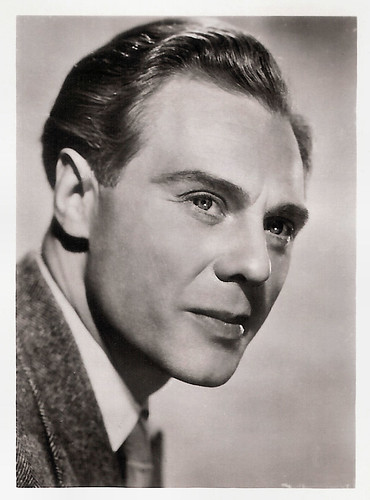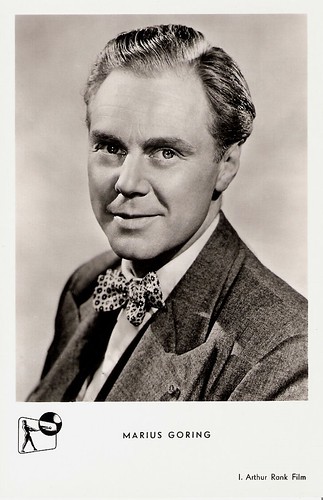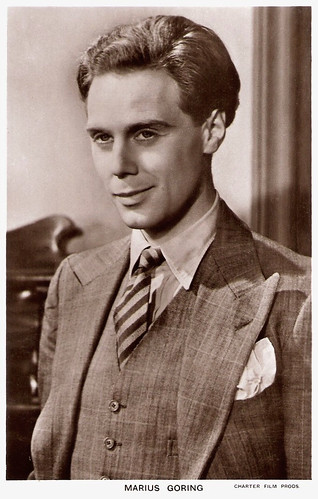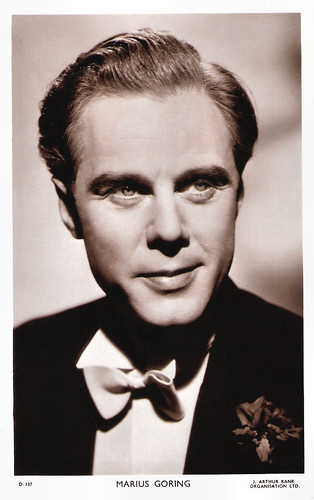English stage and film actor Marius Goring (1912-1998) is best remembered for the four films he made with Powell & Pressburger, particularly as Conductor 71 in A Matter of Life and Death (1946) and as Julian Craster in The Red Shoes (1948). He also regularly performed French and German roles.

German collectors card in the series Filmstars der Welt 2. Band by Greiling-Sammelbilder, Serie E, Bild 105. Photo: Rank.

German postcard by Kunst und Bild, Berlin, no. A 1027. Photo: J. Arthur Rank Film. Publicity still for The Man Who Watched Trains Go By (Harold French, 1952).
Because of his suave looks, Marius Goring was often assumed to be foreign, but he was born in Newport, Isle of Wight, in 1912. He was the son of Dr. Charles Goring and Kate Macdonald. His father was a doctor and criminologist who died in the 1918 flu epidemic when Marius was six. At the Perse School in Cambridge, Marius became a friend of an older boy, the future documentary filmmaker Humphrey Jennings. He first performed professionally in 1927 and then studied under Harcourt Williams and at the Old Vic Dramatic School from 1929 to 1932. He also studied at the universities of Frankfurt, Munich, Vienna and Paris.
His early stage career included appearances at the Old Vic, Sadler's Wells, Stratford and several European tours; he was fluent in French and German. He first worked in the West End in a 1934 revival of Granville-Barker's The Voysey Inheritance at the Shaftesbury Theatre. During the 1930s, he played a variety of Shakespearean roles, including Feste in Twelfth Night (1937), Macbeth and Romeo, in addition to Trip in Sheridan's The School for Scandal.
He made his film debut in Thornton Freeland's The Amateur Gentleman (1935), the screenplay of which was co-written by Clemence Dane. In 1939, he continued his film career with the British sports drama Flying Fifty-Five (Reginald Denham, 1939) starring Derrick De Marney and based on a novel by Edgar Wallace.
That year, he also played a U-boat captain in The Spy in Black (1939), the first collaboration between the British filmmakers Michael Powell and Emeric Pressburger. They were brought together by Alexander Korda to make the World War I spy thriller by Joseph Storer Clouston into a film. The film, starring Conrad Veidt and Valerie Hobson, was named as one of the ten best films of 1939 by the National Board of Review.
During World War II, Marius Goring joined the army, becoming supervisor of BBC radio productions broadcasting to Germany and continued to act under the name Charles Richardson, because of the association of his name with Hermann Göring. Just after the outbreak of war, Goring caused a minor sensation when he portrayed Hitler on a radio series History of the Nazi Party. In 1941, he married his second wife, the actress Lucie Mannheim. The couple later worked together in the TV series The Adventures of the Scarlet Pimpernel (1955).

British postcard in the Picturegoer Series, London, no. 1425. Photo: Charter Film Prods. Publicity still for Pastor Hall (Roy Boulting, 1940).

British postcard in the Picturegoer Series, London, no. D. 137. Photo: J. Arthur Rank Organisation.
After the war, Marius Goring played the effete heavenly Conductor 71, the aristocrat who lost his head in the French Revolution ("my little operation") and who complains of the absence of Technicolor ‘up there’ in the romantic fantasy A Matter of Life and Death (Michael Powell and Emeric Pressburger, 1946). The film is set in England during the Second World War and stars David Niven, Roger Livesey, Raymond Massey, Kim Hunter and Goring.
Two years later, Goring also starred in The Red Shoes (Michael Powell, Emeric Pressburger, 1948). The film employs the story within a story device, being about a young ballerina (Moira Shearer) who joins an established ballet company and becomes the lead dancer in a new ballet called 'The Red Shoes', itself based on the fairy tale 'The Red Shoes' by Hans Christian Andersen. Goring played the young composer in love with the doomed ballerina.
Later he also worked in Powell and Pressbuger’s Ill Met by Moonlight (1957), starring Dirk Bogarde. Other well-known films with Goring are Pandora and the Flying Dutchman (Albert Lewin, 1951) starring Ava Gardner, the Georges Simenon adaptation The Man Who Watched Trains Go By (Harold French, 1952) starring Claude Rains, The Barefoot Contessa (Joseph L. Mankiewicz, 1954) with Humphrey Bogart and Ava Gardner, and The Angry Hills (Robert Aldrich, 1959) with Robert Mitchum.
During the 1960s followed the epic Exodus (Otto Preminger, 1960), The Girl on a Motorcycle (Jack Cardiff, 1968) with Alain Delon and Marianne Faithful, and Erste Liebe/First Love (Maximilian Schell,1970). His final film was the French drama La petite fille en velours bleu/Little Girl in Blue Velvet (Alan Bridges, 1978), starring Michel Piccoli and Claudia Cardinale. Goring’s TV work included starring as Sir Percy Blakeney in The Adventures of the Scarlet Pimpernel (1955), a series which he also co-wrote and produced, Theodore Maxtible in the Doctor Who story The Evil of the Daleks (1967), the title role in The Expert (1968–1976), King George V in Edward & Mrs. Simpson (1980), and The Old Men at the Zoo (1983).
Goring was a founding member of British Equity, the actors' union, and he became its president from 1963 to 1965, and again from 1975 to 1982. Goring's relationship with his union was fraught with conflict: he took it to litigation on three occasions. In 1992 he unsuccessfully sought to end the block on the sale of radio and television programmes to (the still) apartheid South Africa. He was appointed Commander of the Order of the British Empire (CBE) in 1991. His wife Lucie Mannheim died in 1976. The next year Goring married television producer Prudence Fitzgerald, who survived him. In 1998, Marius Goring died from cancer in Heathfield, East Sussex, He was 86.
DVD trailer The Spy in Black (1939). Source: Video Detective (YouTube).
Trailer The Red Shoes (1948). Source: Movieclips Trailer Vault (YouTube).
Trailer The Barefoot Contessa (1954). Source: Movieclips Trailer Vault (YouTube).
Sources: Brian McFarlane (Encyclopedia of British Film), Tom Vallance (The Independent), Wikipedia and IMDb.
This post was last updated on 15 June 2024.

German collectors card in the series Filmstars der Welt 2. Band by Greiling-Sammelbilder, Serie E, Bild 105. Photo: Rank.

German postcard by Kunst und Bild, Berlin, no. A 1027. Photo: J. Arthur Rank Film. Publicity still for The Man Who Watched Trains Go By (Harold French, 1952).
Suave looks
Because of his suave looks, Marius Goring was often assumed to be foreign, but he was born in Newport, Isle of Wight, in 1912. He was the son of Dr. Charles Goring and Kate Macdonald. His father was a doctor and criminologist who died in the 1918 flu epidemic when Marius was six. At the Perse School in Cambridge, Marius became a friend of an older boy, the future documentary filmmaker Humphrey Jennings. He first performed professionally in 1927 and then studied under Harcourt Williams and at the Old Vic Dramatic School from 1929 to 1932. He also studied at the universities of Frankfurt, Munich, Vienna and Paris.
His early stage career included appearances at the Old Vic, Sadler's Wells, Stratford and several European tours; he was fluent in French and German. He first worked in the West End in a 1934 revival of Granville-Barker's The Voysey Inheritance at the Shaftesbury Theatre. During the 1930s, he played a variety of Shakespearean roles, including Feste in Twelfth Night (1937), Macbeth and Romeo, in addition to Trip in Sheridan's The School for Scandal.
He made his film debut in Thornton Freeland's The Amateur Gentleman (1935), the screenplay of which was co-written by Clemence Dane. In 1939, he continued his film career with the British sports drama Flying Fifty-Five (Reginald Denham, 1939) starring Derrick De Marney and based on a novel by Edgar Wallace.
That year, he also played a U-boat captain in The Spy in Black (1939), the first collaboration between the British filmmakers Michael Powell and Emeric Pressburger. They were brought together by Alexander Korda to make the World War I spy thriller by Joseph Storer Clouston into a film. The film, starring Conrad Veidt and Valerie Hobson, was named as one of the ten best films of 1939 by the National Board of Review.
During World War II, Marius Goring joined the army, becoming supervisor of BBC radio productions broadcasting to Germany and continued to act under the name Charles Richardson, because of the association of his name with Hermann Göring. Just after the outbreak of war, Goring caused a minor sensation when he portrayed Hitler on a radio series History of the Nazi Party. In 1941, he married his second wife, the actress Lucie Mannheim. The couple later worked together in the TV series The Adventures of the Scarlet Pimpernel (1955).

British postcard in the Picturegoer Series, London, no. 1425. Photo: Charter Film Prods. Publicity still for Pastor Hall (Roy Boulting, 1940).

British postcard in the Picturegoer Series, London, no. D. 137. Photo: J. Arthur Rank Organisation.
My Little Operation
After the war, Marius Goring played the effete heavenly Conductor 71, the aristocrat who lost his head in the French Revolution ("my little operation") and who complains of the absence of Technicolor ‘up there’ in the romantic fantasy A Matter of Life and Death (Michael Powell and Emeric Pressburger, 1946). The film is set in England during the Second World War and stars David Niven, Roger Livesey, Raymond Massey, Kim Hunter and Goring.
Two years later, Goring also starred in The Red Shoes (Michael Powell, Emeric Pressburger, 1948). The film employs the story within a story device, being about a young ballerina (Moira Shearer) who joins an established ballet company and becomes the lead dancer in a new ballet called 'The Red Shoes', itself based on the fairy tale 'The Red Shoes' by Hans Christian Andersen. Goring played the young composer in love with the doomed ballerina.
Later he also worked in Powell and Pressbuger’s Ill Met by Moonlight (1957), starring Dirk Bogarde. Other well-known films with Goring are Pandora and the Flying Dutchman (Albert Lewin, 1951) starring Ava Gardner, the Georges Simenon adaptation The Man Who Watched Trains Go By (Harold French, 1952) starring Claude Rains, The Barefoot Contessa (Joseph L. Mankiewicz, 1954) with Humphrey Bogart and Ava Gardner, and The Angry Hills (Robert Aldrich, 1959) with Robert Mitchum.
During the 1960s followed the epic Exodus (Otto Preminger, 1960), The Girl on a Motorcycle (Jack Cardiff, 1968) with Alain Delon and Marianne Faithful, and Erste Liebe/First Love (Maximilian Schell,1970). His final film was the French drama La petite fille en velours bleu/Little Girl in Blue Velvet (Alan Bridges, 1978), starring Michel Piccoli and Claudia Cardinale. Goring’s TV work included starring as Sir Percy Blakeney in The Adventures of the Scarlet Pimpernel (1955), a series which he also co-wrote and produced, Theodore Maxtible in the Doctor Who story The Evil of the Daleks (1967), the title role in The Expert (1968–1976), King George V in Edward & Mrs. Simpson (1980), and The Old Men at the Zoo (1983).
Goring was a founding member of British Equity, the actors' union, and he became its president from 1963 to 1965, and again from 1975 to 1982. Goring's relationship with his union was fraught with conflict: he took it to litigation on three occasions. In 1992 he unsuccessfully sought to end the block on the sale of radio and television programmes to (the still) apartheid South Africa. He was appointed Commander of the Order of the British Empire (CBE) in 1991. His wife Lucie Mannheim died in 1976. The next year Goring married television producer Prudence Fitzgerald, who survived him. In 1998, Marius Goring died from cancer in Heathfield, East Sussex, He was 86.
DVD trailer The Spy in Black (1939). Source: Video Detective (YouTube).
Trailer The Red Shoes (1948). Source: Movieclips Trailer Vault (YouTube).
Trailer The Barefoot Contessa (1954). Source: Movieclips Trailer Vault (YouTube).
Sources: Brian McFarlane (Encyclopedia of British Film), Tom Vallance (The Independent), Wikipedia and IMDb.
This post was last updated on 15 June 2024.
No comments:
Post a Comment